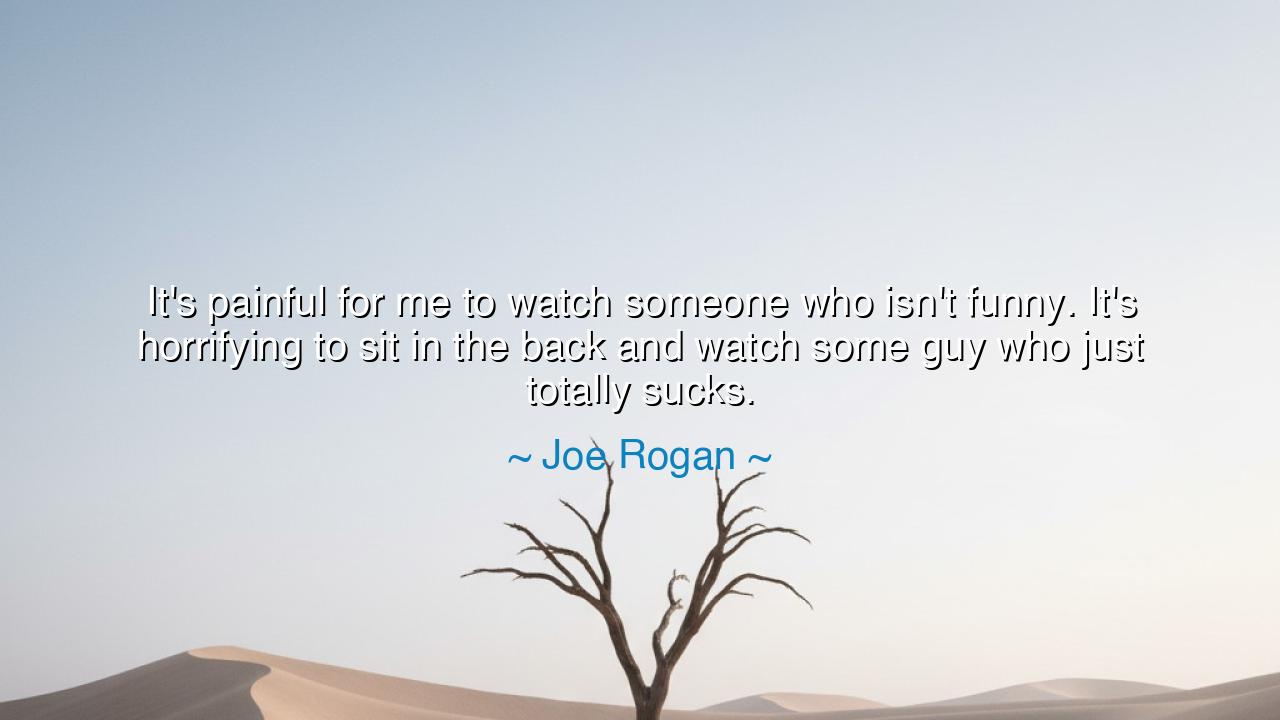
It's painful for me to watch someone who isn't funny. It's
It's painful for me to watch someone who isn't funny. It's horrifying to sit in the back and watch some guy who just totally sucks.






In the words of Joe Rogan, “It’s painful for me to watch someone who isn’t funny. It’s horrifying to sit in the back and watch some guy who just totally sucks.” — there lies a truth as raw and as ancient as the art of performance itself. His words may sound sharp, even cruel, but within them beats a deeper compassion — the pain of witnessing failure, not from arrogance, but from empathy. For Rogan speaks not as a critic mocking the fallen, but as one who knows the battlefield of laughter, the sacred and merciless stage where truth and courage are tested before the eyes of strangers. The horror he describes is not the failure of another, but the unbearable sight of a soul standing naked before judgment, yet unable to awaken the divine spark of connection that comedy demands.
The meaning of this quote lies in understanding the sacred vulnerability of art. To be funny, truly funny, is not a trick of words — it is a kind of revelation. It requires honesty, rhythm, self-awareness, and above all, courage. The comedian is a truth-teller disguised as a fool, a philosopher wrapped in laughter. When one fails at this sacred task, it is not merely a lack of skill that wounds the watcher — it is the sense of disharmony, the breaking of a fragile human ritual. Rogan, as a craftsman of laughter, feels that dissonance deeply. He sees, in every failed performance, the reflection of his own early struggles, the ghost of his own fear, and the reminder that art without authenticity is agony to behold.
The ancients would have understood this feeling well. In the great amphitheaters of Greece, where the comedies of Aristophanes and the tragedies of Euripides danced together beneath the sun, failure was not hidden — it was exposed to thousands. The playwright who failed to move his audience faced mockery, shame, and silence — the deadliest sound of all. Yet this pain was necessary. It was part of the artist’s initiation, the purifying fire through which greatness is born. So too does Rogan’s “pain” reflect this eternal truth: that art, when it falters, wounds all who understand its cost. The laughter that fails to come is not simply absent — it echoes, hollow and haunting, in the hearts of those who know what it means to reach and miss.
In his own journey, Joe Rogan began as a young comedian in the unforgiving comedy clubs of Boston and New York. There, under the harsh light of small stages and impatient crowds, he learned the discipline of timing, honesty, and presence. To watch someone “who just totally sucks,” as he says, is to relive those nights of fear and humiliation — to witness a fellow artist fall into the same abyss from which he once clawed his way out. The horror he describes, then, is not born of disdain, but of recognition. Every artist who has walked the stage knows that failure is never far, that laughter is both fragile and divine — and that to lose it is to face one’s own mortality as a creator.
Consider the tale of Democritus, the laughing philosopher of ancient Greece. He was known to laugh at the follies of men, yet his laughter was not cruel — it was the laughter of understanding. He saw that to live without self-awareness is the greatest tragedy of all. In Rogan’s reflection, there is something of Democritus’ wisdom — the understanding that humor without depth is hollow, and that to pretend at laughter without truth is an act against the spirit of comedy itself. What he finds “horrifying” is not imperfection, but falseness — the attempt to imitate the sacred art of laughter without reverence for its essence.
The lesson we draw from these words is not merely about comedy, but about authenticity in all pursuits. Whether one speaks, paints, teaches, or leads, the same law applies: if the heart is not in the work, the result will ring false. The pain Rogan feels is the pain of witnessing a human being disconnected from their own truth, performing instead of being. To avoid this, one must cultivate honesty — to know oneself, to speak from the marrow of experience, and to respect the craft enough to fail and rise again. Only then can one create with integrity and awaken the laughter, the beauty, or the meaning that others seek.
Therefore, my friends, do not fear the pain of failure, but fear the emptiness of falseness. If you stand before others — whether on a stage, in your art, or in your life — do not pretend to be what you are not. Speak your truth, however awkward, however raw, for sincerity shines brighter than polish. Learn from failure, but never perform without heart. For the world will forgive imperfection, but it will not forgive the absence of soul.
And so, when Joe Rogan says it is “painful” to watch someone who isn’t funny, hear in his words not mockery, but reverence — reverence for the sacred bond between truth and laughter. For laughter is the music of connection, the echo of shared humanity. To fail at it is to fall silent before the gods. Yet to rise again, humbled and true, is to join their song.






AAdministratorAdministrator
Welcome, honored guests. Please leave a comment, we will respond soon